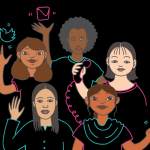Few years ago, we envied bank employees. We saw them as the epitome of success with their starched, blinding-white shirts and black as earth polished shoes. Millennials like me went to school with the singular dream of working in the bank. Few years down the line, the story has become completely different. Most people today will reject even the idea of a bank job. Why?
Work today and in the near future shows unparalleled opportunities, but also significant challenges. Globalization, the recent COVID pandemic and demographic change are having a profound impact on society and labor markets. It’s the reality. Change is not negotiable. But most people don’t envision change; they only see it after it has come. Well, we are hoping you are not like most people.
So in today’s POST, we bring you 15 things to need to know about the future of work.
This post is brought to you by After School Africa. If you are new to these posts from us, welcome. We aim for all-round education of young Africans. Consider joining 20000+ others in subscribing to AfterSchoolAfrica on Youtube to continue exploring opportunities and watching videos like this one below:
WATCH: 30 Best Legitimate Online Work Opportunities that Pay Well!
Let’s begin
Table of Contents
1. Certificate is becoming less valuable
Presently, major companies like Google, Apple, Ernst & Young and other top companies no longer consider a university degree as prerequisite for hiring. Candidates are hired based on their skills, experience and ability to adapt. Academic qualification ranks among the least requirements. Many companies are already following this path. In the near future, work is going to be all about what you can do and not what certificate you have.
2. Creativity is a Major Job requirement
In a world where most people conform to the norm and play it safe, people who have the ability to express their creative thinking skill will be at the top of the food chain. People are hungry to see new things. They are quick to get bored and desperately need their imagination stimulated. Creative thinking skill is becoming even more important in jobs of the present and future.
3. Technology Will Go beyond What we know today
If someone in a comma for the past 20 years should wake up today, they might faint from not recognizing the world they’ll be meeting today; much credit to internet, telecomms and COVID-19. Now, think about how much would have changed in the next 2 decades. Get ready for new kinds of jobs and life changing techs from artificial intelligence, machine learning, augmented and virtual reality, 5G network, driverless cars, flying delivery drones and more to come.
4. Most physical work will be Automated
Since Amazon made wave with the launch of its Amazon Air drone delivery services, a few years ago, the list of businesses using drones are growing as we speak; from delivering blood for emergency patients, to diffusing bombs. It’s not only delivery services that are under threat from automation. Customer service, banking service, military, most manufacturing lines are all undergoing intense innovation towards automation as we speak. This is why the real jobs of the future will depend more on empathy & creativity.
WATCH: Top 10 Skills that’ll Make You More Employable than Most People and How to Improve them
5. Robots will become a part of the society
Why send humans to life hazard areas like terrorist or natural disaster rescue zones, when we can send robots. This is not just stuff of fiction. Companies and countries are already making head way in these areas.
Before you say, “well, this is Africa. It is not related to us”. At the early days of internet technology, would you have imagined the impact the technology would have in the African continent? The world is fast becoming a global village. And what applies to one, will eventually apply to all.
6. Internet speed will become almost instant
The current 4G network technology made mobile internet up to 10 times faster than 3G. This allowed support for HD TV on mobile, quality video call and fast internet browsing. With speed of up to 100 gigabits per second, 5G network is speculated to be 100 times faster than 4G. Yo! That’s 100 gig of data transferable in one second. You possibly cannot imagine what is to come with this innovation: medical breakthroughs, driverless cars, swift wealth growth and transfers. All of these and more are worth anticipating.
7. There will be population surge in Africa
From 1950 to 2010, sub Saharan Africa grew by over 360%, from 186 million to 856 million. In comparison, Europe only increased by 35% within this period. These new people will need to eat, house, cloth and work. Depending on how this population surge is handled, it could become Africans greatest asset or its worst nightmare.
8. More Young Africans will spread across the world
The proportion of the world’s young people between the ages of 12-24 years living in Africa is expected to rise from 18 per cent in 2012 to 28 per cent by 2040, while the shares of all other regions is expected to decline. The decline of young people in other parts of the world will create demand for young people from other regions. If Africa plays its part well enough, it will be in a good position to export its young talents across the world.
WATCH: Top 10 Jobs that’ll Pay You to Travel the World!
9. Someone can predict almost your every move
With your smart phone and internet activities, someone can tell your life story. From where you go, who you interact with, what you buy, how you spend money, what you do, your health history and many other information. With this data collected from billions of people across the world, every day, that’s BIG DATA. Organizations with access to such information can predict your next move. You won’t be as free as you think. Companies who control this data can control the job market. This also means more jobs for people in Data related-fields.
10. Cyber Security will be a bigger deal
When power is concentrated in few places, it’s bound to attract greater corruption. That is why systems of government where power is concentrated among a few tend to attract stronger and, sometimes, bloody competition to acquire such positions. With cloud computing and as companies continue to acquire more power through the data they accumulate, there will be more incentives to gain access into such databases. This also means that there will be more demand in the fields of Cyber security.
11. New Skills will be required but many old skills will still be useful
Contrary to the common predictions that technology will take away jobs, and leave people jobless. Many jobs will remain; and many new jobs will be created.
We may not be able to say what new skills will be required, but you can be sure that some present skills can be transferred into these new roles. For instance, with the advent of computer applications for typing, typewriters became obsolete. But typists were able to transfer their existing typing skills into working with keyboards. However, they still had to learn how to operate a computer. While some new skills will need to be learned, some old skills will still be useful.
12. Adaptability will be More Important than Skills
Often times, you will need to move from one software application to another to complete a project. If you are proficient in Java, for instance, you’ll encounter other programming languages in the course of your work. If you are a video editor, you’ll have to cross tools to get desired results. As new technologies continue to enter the market, being skilled in one tool will not be as important as the ability to identify and use the right tool for each specific task.
If you are going to be relevant in your field, you must be flexible enough to learn different ways of doing the things you do. There will be a lot of opportunities, but some of these opportunities will require the ability to adapt.
13. Digital and Media Will be the new Literacy
We know literacy to be the ability to read and write. In the near future, literacy will be characterized by the ability to use basic technology tools, and communicate with the digital world. This is already taking place. Many companies today will not consider hiring you if you are deficient in basic technology skills. This is increasingly becoming a requirement. To stay relevant, you must be up to date with digital and media skills for maximum productivity.
14. There Will Be Rapid Disruption in the Education Sector
People are beginning to reconsider the idea of spending the first 23 years of their live on formal education. Many countries of the world today are still practicing the education system designed for the 2nd industrial revolution; whereas the world is catching up on the 4th industrial revolution. The education system of today is no longer serving the job market and industries adequately. People are beginning to seek alternative form of learning. YouTube videos, online courses are becoming more popular. Education companies are springing up creating be-spoke learning experiences. This further explains the first point; on why top tech companies no longer lay emphasis on degree certificate. What should you do? While you are pursing your academic degree, do well to keep in touch with the market needs and develop along that line.
15. Virtual Collaboration Skills is becoming increasingly popular
Virtual collaboration enables talented peers to work together regardless of location. It allows organizations to mine the collective wisdom of a widely dispersed team. Many roles today no longer require employees to work 9 to 5 in one location. The days of spending many hours in office as an employee are gradually coming to an end. Employees will need to learn new ways of working with peers through virtual collaboration.
There you have it. what do you think about the impact of these points on the future work? Let us know in the comment section. If you are yet to subscribe to After School Africa, now is a good time for subscribing.
Until next time, YOUR SUCCESS MATTERS!










